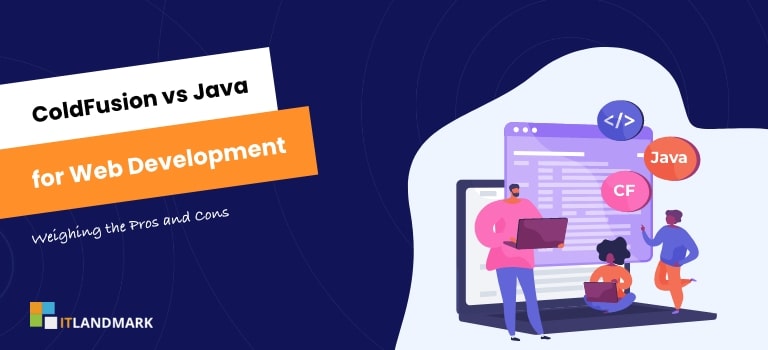
Whether you’re a seasoned pro or just starting out, choosing the right language can make all the difference. ColdFusion and Java each have their own strengths and weaknesses, so it’s important to weigh your options carefully. In this article, we’ll dive deep into both to help you make an informed decision and take your website to the next level.
We’ll go over the pros and cons of each language, examine their capabilities when it comes to building applications, and ultimately give you all the information you need to make an informed decision about which one is better for web development.
Table Of Contents
- Overview of ColdFusion
- Overview of Java
- Pros and Cons of ColdFusion
- Pros and Cons of Java
- Developing Applications with ColdFusion
- Developing Applications with Java
- Comparing ColdFusion and Java
- Choosing the Right Language for Your Needs
- Frequently Asked Questions
- Conclusion
ColdFusion Vs Java – Which Is Better?
Confused between ColdFusion and Java for your web development project? This in-depth comparison sheds light on their features, advantages, and best use cases to help you make an informed decision and build a successful website or application.
Overview of ColdFusion
Using ColdFusion to craft content can simplify the process of creating engaging and compelling websites. Developed by Adobe Systems Inc., ColdFusion (CFML) is a programming language specifically designed for web development. It provides an easy-to-use syntax and robust features that allow developers to quickly create dynamic applications and responsive web designs.
Let’s take a closer look at the basics of CFML as well as its advantages and disadvantages. ColdFusion Basics are simple enough for novice coders. With just basic HTML knowledge, anyone can start building interactive sites in no time using CFML Syntax. This versatile scripting language integrates seamlessly with various databases such as MySQL and MS SQL Server, making it ideal for data-driven projects like eCommerce stores or enterprise systems. Additionally, its support for popular technologies like AJAX ensures smooth integration between components of your site.
The key advantage of CFML lies in its speed – you can build complex projects faster than ever before! Plus, since most web servers come preconfigured with ColdFusion installed, there’s no need to install any special software or libraries either – this makes deployment quick and painless. On top of that, coding errors can be quickly identified due to built-in debugging tools within the program itself. However, while the performance of ColdFusion is undeniable, some may find its cost prohibitive compared to open source solutions like Java or PHP which provide similar capabilities without licensing fees being involved.
In conclusion, ColdFusion offers tremendous value when it comes to developing powerful applications rapidly and efficiently due to its user-friendly syntax and comprehensive feature set – though certain limitations may exist depending on your project needs.
Also Read: ColdFusion Vs Other Programming Languages
To get a better idea if it’s right for you, let’s explore what Java has to offer next…
Overview of Java
Java is a powerful programming language perfect for creating robust web applications! With the number of tools available, it’s easy to get started with Java. It is a platform-independent technology that runs on any operating system and comes with many features that make web development easier and faster such as Cloud Integration, API Integration, Mobile Development, Database Connectivity and Security Considerations.
In addition to its cross-platform capabilities, Java also offers an extensive library that can be used to create custom software solutions. This makes it ideal for both large enterprise projects and small business needs where quick turnaround times are essential.
Due to the complexity of some aspects of Java however, those new to coding may find it difficult to understand certain concepts or use specific libraries without proper guidance from experienced developers. Additionally, due to its vastness there are certain tasks which require extra effort compared to other languages like ColdFusion.
However this does not detract from the fact that Java has become one of the most popular choices for developing websites as well as mobile apps today!
With so many advantages offered by Java, it’s no wonder why numerous businesses have adopted this technology over others when looking for web development solutions – but how does it compare to ColdFusion? Let’s explore these two technologies side by side in order to determine which would work better depending on your project requirements.
Also Read: 8 Best Adobe ColdFusion Alternatives
Pros and Cons of ColdFusion
You may be wondering what sets ColdFusion apart from Java, and if it’s the right choice for your project – so let’s take a look at some of its pros and cons!
- Rapid development due to its tag-based scripting.
- Simplified code reuse with the use of tags instead of complex languages like Java.
- Reduced likelihood of errors thanks to its streamlined approach to web development.
- Comprehensive built-in functionality for various web development tasks.
- Strong integration capabilities with databases and other systems.
- Excellent for developing dynamic and interactive web applications.
- Robust security features to protect web applications from vulnerabilities.
- Built-in performance evaluation tools enable developers to track progress, ensuring timely completion of projects without sacrificing quality.
With all this in mind, you now have a better understanding of the pros and cons of using ColdFusion – so consider how these factors weigh up against Java when deciding which platform best suits your needs!
Also Read: ColdFusion Vs Python
Pros and Cons of Java
Let’s explore the pros and cons of Java for web development:
- Cost Consideration: Java is often considered more economical due to lower licensing costs. However, other expenses like hosting and software updates should also be factored in.
- Security Features: Java is preferred by many developers for its robust security measures, offering additional layers of protection.
- Versatility: Java’s versatility across multiple platforms is a notable advantage. However, its complexity may lead to a steeper learning curve.
- Popularity and Support: Despite its challenges, Java’s popularity continues to grow, supported by extensive library resources and regular updates from Oracle Corporation.
It’s up to you to decide whether taking on the challenges posed by Java is worth any potential rewards it could bring your web development projects!
Developing Applications with ColdFusion
If you’re looking to build an application with lightning-fast speed and ease, ColdFusion is the way to go. Developing applications with CFML (ColdFusion Markup Language) provides a number of advantages.
Creating data sources can be done quickly in ColdFusion, as it supports most popular databases out-of-the-box. It also has built-in functions for debugging CFML code which helps reduce development time significantly. Moreover, there are a variety of security best practices that developers should adhere to when creating web apps with ColdFusion such as using secure authentication methods and encryption protocols.
Besides its robust features, one of the biggest advantages of developing applications with ColdFusion is access to a wide range of CFML libraries and frameworks like FW/1 or Mach II. These open-source tools provide developers with powerful capabilities that help them create complex applications much faster than they would otherwise have been able to do so without them. Additionally, these libraries make it easier for teams to collaborate on projects since everyone will be working within the same framework.
Overall, developing applications with ColdFusion offers many benefits over Java due to its quick setup process, built-in functionality for debugging purposes, and easy access to CFML libraries and frameworks that make building complex applications more straightforward.
Thus if you’re looking for an efficient platform to develop an application on then look no further than ColdFusion!
Also Read: ColdFusion Vs .NET
Developing Applications with Java
With Java, you can create powerful applications that are tailored to your specific needs. Its versatile programming language allows for integrating different components and platforms with ease.
The numerous tools available make it easy to develop complex software solutions quickly, while also providing performance optimization features like garbage collection and memory management.
Furthermore, its extensive documentation makes understanding the fundamentals of Java a breeze.
Java is one of the most popular languages in web development due to its scalability and robustness. It offers many advantages over other technologies such as being able to be used on multiple operating systems with only minor modifications.
Developers can easily integrate existing code into their projects or use frameworks like Spring or Hibernate for more advanced tasks such as database access or automated testing.
Additionally, Java has a wide range of libraries that allow developers to add extra functionality without having to write everything from scratch each time they need something new.
Whatever project you’re working on, Java provides an abundance of options when it comes to creating applications that meet your exact specifications and requirements.
With all these resources at hand, developing in Java can be both efficient and enjoyable; not only do you have plenty of support but there’s always room for innovation!
Comparing ColdFusion and Java
You may be wondering which platform offers a more efficient and dynamic approach to application development: ColdFusion or Java? Alluding to their respective strengths, you can make an informed decision on the best option for your project.
To begin, it’s important to understand how each of these platforms compares when it comes to features and capabilities. ColdFusion is known for its speedy development time as well as hosting options that are easily accessible from multiple providers. It also provides flexibility with scalability, allowing developers to quickly scale applications based upon user demand. Additionally, ColdFusion has a relatively short learning curve compared to other languages such as Java, making it easier for new users to get up and running quickly. On the security side of things, ColdFusion has robust built-in authentication mechanisms — something that many developers find attractive. Finally, its cost-efficiency makes it a great choice for those looking for an affordable solution without sacrificing quality.
Java is another popular language among web developers due to its versatility and ability to create high-performing applications in virtually any environment. One major benefit of using Java is that there’s no need for additional tooling; most of what’s needed is included in the standard installation package. As far as security goes, Java includes advanced encryption algorithms that help ensure secure data transmission across networks. While Java does have a steeper learning curve than some other languages like ColdFusion, experienced developers should not experience too much difficulty getting up and running with this powerful language. With all of these factors combined, it’s easy to see why so many people choose Java as their go-to language for creating reliable web applications.
When deciding between Cold Fusion and Java for developing applications it ultimately boils down to personal preference along with considering several key aspects such as hosting options, the learning curve required, security considerations, and overall cost efficiency before committing one way or another. Both solutions offer unique advantages depending on the type of application being developed but careful analysis will lead you in the right direction towards success.
Also Read: ColdFusion Vs PHP
Choosing the Right Language for Your Needs
No matter the project, it’s important to choose a language that best suits your needs. When considering ColdFusion and Java for web development, you should consider platforms comparison, cost analysis, learning curve, security considerations, code optimization and other factors.
Both languages offer unique benefits but understanding their differences will help you decide which is right for you.
When comparing the two languages from a platform perspective, we can see that ColdFusion runs on Windows, Linux and Mac OS X while Java requires an application server such as Tomcat or GlassFish to run in addition to its own JDK (Java Development Kit). This means that if you’re running applications across multiple platforms then ColdFusion may be more suitable due to its cross-platform compatibility.
The cost of each language also needs to be taken into account when making your decision. The initial costs associated with setting up a Java environment are usually higher than those associated with ColdFusion; however both require ongoing maintenance costs which must also be factored in. Additionally, there are various third-party libraries available for both languages which can reduce development time but would incur additional costs depending on usage requirements.
Finally, the learning curve of each language should be considered before making a final decision. While neither language is particularly difficult to learn they do have distinct advantages and disadvantages depending on user familiarity with coding concepts. In addition to this, security considerations need to be taken into account since both languages allow developers access to databases and related data sources.
Last but not least is code optimization which is an important factor when creating high performance websites using either language so make sure you research thoroughly before choosing one over the other!
Frequently Asked Questions
What is the cost of developing applications in ColdFusion and Java?
Developing applications with ColdFusion and Java is a cost-effective process, depending on the complexity of your project. ColdFusion offers an open-source platform making it more affordable than its counterpart. Additionally, development speed tends to be faster when using ColdFusion as compared to Java due to the simplicity of coding in this language. Code maintenance for both languages can be complex but if you’re looking for architecture flexibility then Java is better equipped since it’s object-oriented and has better scalability options than ColdFusion. Still, by leveraging the power of ColdFusion you can create innovative solutions that are high performing and secure at a great value.
What type of technical support is available for ColdFusion and Java developers?
Learning curves, performance evaluation, community resources, and documentation availability are all important considerations when evaluating a web development platform. ColdFusion and Java offer both technical support and industry trends to ensure that developers can stay on top of the latest advancements in technology. With comprehensive learning curves for each platform, you can quickly become proficient with either language. Performance evaluations will help you determine which is best suited for your needs. Additionally, there are plenty of online communities filled with experienced users willing to answer questions or provide guidance. Finally, ample documentation ensures that all aspects of development remain easy to understand and troubleshoot any issues along the way.
What is the scalability of ColdFusion and Java applications?
You may wonder about the scalability of ColdFusion and Java applications. Well, when it comes to performance benchmarking, you can rest assured that both offer great results. With code reuse and cross-platform compatibility being key features for success in web development, consider that debugging tools are available with each as well as automated testing capabilities. Whether you’re looking for an efficient solution or one with increased innovation potential, both ColdFusion and Java provide amazing options for your project needs.
What are the security considerations for ColdFusion and Java applications?
You may have heard about the scalability of ColdFusion and Java applications, but what you really need to know is the security considerations for each platform. Authentication, data storage, performance tuning, and API integration are all areas where potential vulnerabilities can emerge. When it comes to protecting your application from malicious attacks or unauthorized access, both ColdFusion and Java offer robust solutions that provide a high level of security. However, depending on your specific needs and system requirements, one platform may be better suited than the other. In-depth technical knowledge is key when evaluating these platforms’ security features in order to make an informed decision for your web development project.
How quickly can ColdFusion and Java applications be deployed?
Deploying applications with ColdFusion and Java can be done quickly and effectively. With code reusability, database connectivity, automation tools and performance tuning capabilities, your application will have the necessary components to get up and running in no time. Additionally, both ColdFusion and Java are cloud-integrated meaning you don’t need to worry about setting up a server or configuring databases; instead it is all handled for you seamlessly. As an added bonus, these technologies also provide fast performance optimization so that your web app is always running at optimal levels.
Conclusion
In conclusion, when it comes to web development, you have two reliable choices: ColdFusion and Java.
Each language has its own advantages and drawbacks.
It’s important to consider the pros and cons of each one carefully before making a decision that best suits your project needs.
Both are powerful languages with diverse capabilities – but ultimately, only you can decide which one is right for your particular application.
Taking the time to make an informed choice will be well worth it in the end.



